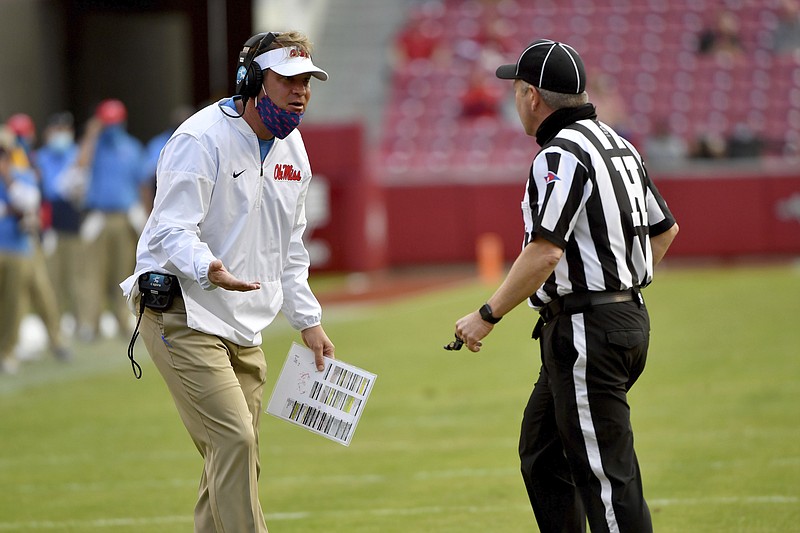So let's get this straight: For telling the truth about one of the more atrocious calls Southeastern Conference football officials have made this season - and that's saying something - Ole Miss coach Lane Kiffin is fined $25,000?
Good thing he didn't lie about it.
OK, I get it that the league to end all football leagues can't have its coaches whining about every missed call unless they also want to thank the league for every call that goes their way. Of course, at this point in the season that would pretty much be a one-man gang of Auburn coach Gus Malzahn, but more on that in a minute.
There's even an SEC bylaw - Bylaw 10.5 - that rather clearly states, in part, "Criticism of officials or the officiating program by institutional personnel is absolutely prohibited."
It adds: "(Comments on officiating) are to be directed only to the Conference office."
But when the whole country that has access to the SEC Network has already watched at least half-a-dozen replays of an Ole Miss kickoff grazing the finger of Auburn return man Shaun Shivers on its way to the end zone - a gaffe that should have resulted in a Rebel touchdown once an Ole Miss player fell on the ball in the end zone - it seems somewhat fair for Kiffin to explain what an SEC official told him along the sideline.
Or as Kiffin acknowledged on Monday: "Everybody in the country could see it hit him."
Well, everybody but the replay official.
So Kiffin retweeted the sentiment of one fan who no doubt echoed what a lot of SEC fans have been thinking for years, but particularly this season: The officiating is a disgrace.
Not that Kiffin stopped there. After all, if your wallet's going to be $25,000 lighter for speaking your mind, you might as well get your money's worth. So the former University of Tennessee head coach joked about the fine wiping out his young son Knox's future college tuition money.
Kiffin later retweeted a Tweet from a national reporter that went as follows:
"Lane Kiffin: Replay blew it
SEC: Replay blew it
Also SEC: Here's a $25,000 fine, Lane, for correctly pointing out we blew it."
Kiffin also added: "I asked the side judge, 'Why aren't they replaying it? Do I need to challenge it?' He said, 'They've already looked at it. There's nothing there.' I'm not allowed to say anything about the conversation, but I really wish that our fans and players could hear what I was told."
Nothing there? There should be no assignments there the rest of the year for the replay guy and that side judge.
The problem is, this is far from the only major mistake the league's zebras have made this season. All of which brings us to Auburn, which has run afoul of the NCAA rule book more times than anyone in the league save Texas A&M.
It all started with a touchdown Kentucky scored on the Tigers just before halftime in the season opener. Though every member of the SEC Network broadcast team confirmed the replay showed the Cats scored in a game in which they would also get the ball to start the third quarter, the SEC replay crew wouldn't give UK the points.
Then came the Auburn-Arkansas game and the infamous backward pass that should have given the Razorbacks the ball and the win. Instead, the SEC crew ruled it an incompletion, Auburn kicked a field goal and won.
Even in the Tigers' loss to South Carolina, the Gamecocks had a touchdown called back on a highly questionable holding call.
If Malzahn isn't playing the lottery every week he's surely costing himself millions.
Look, we all know officials are going to make mistakes. They're human. The game's probably tougher than ever to officiate. But that doesn't let the replay official off the hook. As they've proved numerous times, time is not of the essence, even if it should be. They can spend forever, or at least five or six minutes, studying the replay, especially in basketball.
Perhaps that's why ESPN recently reported that the only conference in the country last year where basketball fouls failed to decline was the SEC.
But returning to football, it shouldn't be that hard to get it right on review.
Then there's the targeting rule, which may be judged wrongly more times than basketball's block-charge call.
Maybe, deep down, it's that a lot of old-timers resent the rule. It's football. It's a violent sport. Let it remain that way, regardless of the collateral damage from vicious head hits meant to knock the player out of competition.
But in Saturday's Alabama-Tennessee game, UT defensive back Jaylen McCollough was flagged for what appeared to be a textbook target early on. The TV announcers said so. The retired referee CBS was using to analyze calls echoed their sentiments. But after replay, the SEC said there was no targeting, which also meant there was no 15-yard penalty.
When college football first instituted the targeting rule, the 15-yard penalty was automatic, but the ejection depended on what the replay revealed. If the NCAA really wants to make the sport safer - and it needs to - it should reinstitute the 15-yard penalty for any hit that begins from the neck up. Eject them only for targeting, but make the 15-yard penalty mandatory.
That said, there is so much to praise SEC commissioner Greg Sankey for regarding the conference leading the way to major conference football's return in a pandemic. It hasn't been without its challenges and hiccups, but halfway along, it's surely gone much better than anyone anywhere thought it could except for the officiating.
Unless, of course, you're Auburn.
Contact Mark Wiedmer at mwiedmer@timesfreepress.com.
